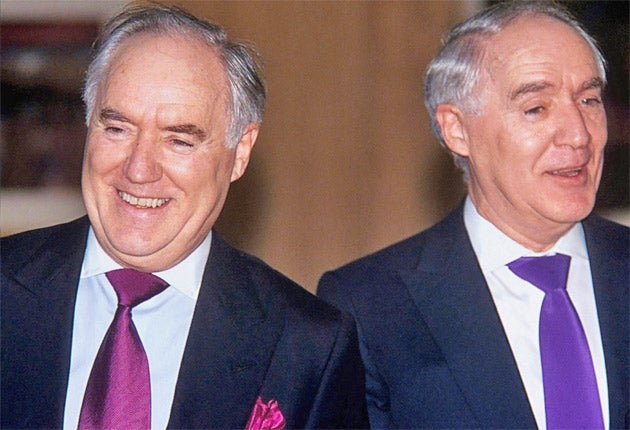First the sting, now recriminations sink in for the Barclays
Telegraph may face ethics investigation – but how was the scoop 'leaked' to BBC?

It took only a few moments for the air of satisfaction to dissipate on the editorial floor of The Daily Telegraph, which is based close to Buckingham Palace in London.
The reason for the dramatic change in mood was the sight of Robert Peston, the BBC Business Editor, on a large television screen revealing, in his singular staccato delivery, details of a precious scoop that the Telegraph had believed to be under lock and key.
The BBC man had been listening to secretly recorded conversations that had been circulated among only a handful of Telegraph journalists.
Worse, Peston was suggesting that the “whistleblower” who had supplied him with the material believed there was a commercial reason why the paper did not publish the juiciest of details from the tapes collected by its reporters, who posed as constituents of the Business Secretary Vince Cable. As damage limitation, the Telegraph’s publicists issued a statement saying it was “utter nonsense” to suggest the information had been withheld for commercial reasons.
Yesterday at the Telegraph the recriminations continued. The overwhelming sense was one of betrayal. A small hand-picked team had pulled off a coup, only for a treacherous colleague to carry their doubloons to a rival. Telegraph sources were adamant that the Cable recording had not been allowed to leave the building.
Having distinguished itself with its tightly-managed operation to reveal the expenses details of MPs – in spite of attempts by rival media organisations to prise the story away – the Telegraph thought it had honed its approach to such big stories. In fact, the team handling the undercover stings on a series of Liberal Democrat politicians was much smaller than that deployed on MPs’ expenses, and the information gleaned was deliberately withheld from the news lists circulated among the paper’s executives.
Telegraph sources were adamant that Peston’s “whistleblower” could be nothing of the sort, because he or she would have not been included in discussions on how the paper would use Mr Cable’s sensational comments that he had “declared war” on Rupert Murdoch’s media empire.
Peston – who as the former City Editor of the Sunday Telegraph is well-connected to senior figures within that organisation – expressed scepticism that The Daily Telegraph’s editor Tony Gallagher, admired for his news sense, would prefer the paper’s initial headline (about Cable’s willingness to undermine the Coalition if he didn’t get his way) to the explosive views about Murdoch (the story that really damaged the Business Secretary).
The commercial operation of the Telegraph, which is owned by the reclusive Barclay twins, is known for its pugnacity. But a leak from that quarter would hardly make sense, given that the Telegraph Media Group chief executive Murdoch MacLennan is leading the campaign to block News Corp’s complete takeover of BSkyB – and Mr Cable was its greatest asset. The greater likelihood, as an internal inquiry continued yesterday, is that the source of the leak is in the editorial department.
Worse may be to come for Mr Gallagher, as concerns grow over the methods the newspaper used to obtain its information. Holly Watt, 28, and Laura Roberts, 29, posed as constituents and young mothers to encourage Lib Dem ministers to make unguarded comments revealing their real views on Coalition policy.
Nick Robinson, the BBC Political Editor, questioned whether such tactics would damage the democratic process. “Starting from today, politicians will be more wary about what they say to their own constituents... Candour will be less common, not more.” The Press Complaints Commission, which has previously stated that subterfuge cannot be used as a fishing exercise but only when investigating a prima facie case in the public interest, said last night that it has received a handful of complaints about the reporting from the public but none from the MPs themselves.
Last night David Howarth, a former Lib Dem MP and a law don at Cambridge University, suggested that the Telegraph journalists might have broken the law, which forbids making dishonest statements with the intent of putting an individual at risk of pecuniary loss. He said the reporters would have been asked to sign forms giving their names and addresses and the nature of their inquiries. Some Telegraph reporters appear to have posed as constituents of more than one MP. Mr Cable’s office has uncovered a form filled out by Ms Watt claiming to be “H Williams” and being a young mother wishing to talk about child benefit.
Mr Howarth questioned whether false statements in such circumstances could be justified as being in the public interest. “The underlying problem for the Telegraph is that there’s no suggestion that any of what these MPs were doing was in any sense illegal.”
The Daily Telegraph will continue publishing its secretly-recorded revelations until Christmas, but the story may run for much longer.
Subscribe to Independent Premium to bookmark this article
Want to bookmark your favourite articles and stories to read or reference later? Start your Independent Premium subscription today.

Join our commenting forum
Join thought-provoking conversations, follow other Independent readers and see their replies